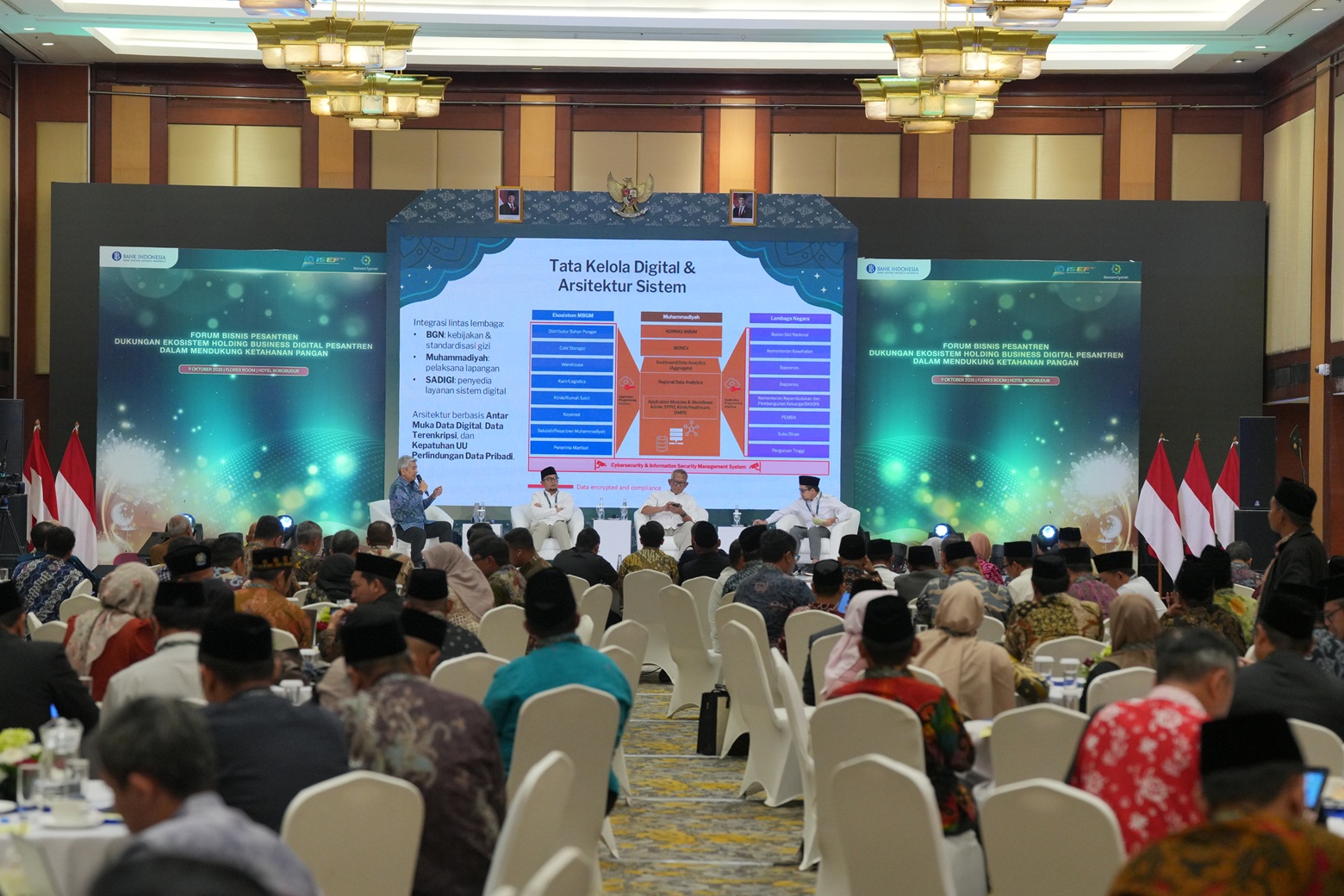No: 27/239/DKom
Pesantren (Islamic boarding schools) have a socio-economic ecosystem with massive potential to support national food security. With more than 41,000 institutions spanning the breadth of the Indonesian archipelago, along with their assets, underpinned by cross-sector collaboration through the strengthening of the digital ecosystem, pesantren are expected to enhance the competitiveness of the halal food sector, while nurturing economic equality. That was highlighted during the launch of Pesantren Digital Holding Business Ecosystem Support for Food Security at the 12th Indonesia Shari'a Economic Festival (ISEF) in Jakarta (09/10/25). The event reaffirmed the joint commitment to strengthening the role of pesantren as drivers of economic independence in the community and a pillar of national food security.
The Coordinating Minister for Food Affairs of the Republic of Indonesia, Zulkifli Hasan, expressed his appreciation and support for this program that is strengthening food security through pesantren. This is in line with the Government's Asta Cita program to strengthen the national food sector, involving the participation of all national elements, including pesantren throughout the archipelago. Empowering pesantren will grow and develop creativity and productivity, thereby contributing to economic advancement. “Through this program, pesantren are expected to grow, regions are expected to grow, and the economy is expected to grow," said Zulkifli.
BI Senior Deputy Governor, Destry Damayanti, stated that pesantren are not only centres of education and religious learning, yet also pillars of the economy on the front line of maintaining national food security. “Through a digital ecosystem, Bank Indonesia aims to collectively build and develop pesantren to be solid, blessed and sustainable," added Senior Deputy Governor Destry. Strengthening the economic ecosystem of pesantren, BI initiated the institutional development of pesantren, namely the Pesantren Economy and Business Association (HEBITREN) and Nusantara Pesantren Digital Cooperative. BI is also developing the 'Pesantara' virtual market platform to facilitate transactions between pesantren, strengthen cooperation and provide access to finance from the ecosystem of Baitul Maal Wat Tamwil (BMT), sharia rural banks (BPRS) and other Islamic financial institutions. This initiative is consistent with Bank Indonesia's mandate to support inclusive sharia economic and financial development in line with the Government's Asta Cita program.
In synergy with the Coordinating Ministry for Food Affairs and supported by the Directorate General of Islamic Education of the Ministry of Religious Affairs, Bank Indonesia launched Pesantren Digital Holding Business Ecosystem Support as the tangible manifestation of government and cross-sector support to strengthen food security. This program is expected to unlock opportunities for business collaboration between pesantren, while expanding the partnership network with Islamic financial institutions, government agencies and businesses. Through the Pesantara platform, pesantren can strengthen food supply chains end-to-end, optimise their productive assets as well as expand access to Islamic finance.
The contribution of pesantren to strengthening food security is consistent with Bank Indonesia's commitment to expanding the halal value chain, specifically the halal food and beverages sector. Pesantren, as providers of halal food, should be supported in further developing their processing capabilities to meet halal standards and remain competitive in the global market. To that end, Bank Indonesia is collaborating with the Islamic Chef and Culinary of Indonesia (ICCI), Halal Certification Agency (BPJPH) and World Islamic Chef's Association (WICS) to host the third Halal Chef Competition (IN2HCC) in Jakarta (08/10/25), as part of the 12th ISEF activities. This competition serves as a platform to strengthen Indonesia's role in the global halal ecosystem through halal culinary innovation and collaboration. The event also reflects Indonesia's firm commitment to becoming a global halal culinary hub through creativity, synergy and noble halal values. This year, IN2HCC attracted 250 local and international participants, including professional chefs, halal culinary MSMEs and students from vocational colleges and universities. In addition, 20 international culinary experts from Indonesia, Malaysia, Brunei Darussalam and Saudi Arabia also took part as judges.
BI will continue strengthening synergy with pesantren, the Government, and all stakeholders to advance economic independence in the community and bolster national food security. In line with the spirit of ISEF 2025, BI is optimistic that pesantren will become a key pillar in the development of a solid, inclusive and sustainable sharia economy towards national resilience.
Jakarta, 9th October 2025
Communication Department
Ramdan Denny Prakoso
Executive Director


